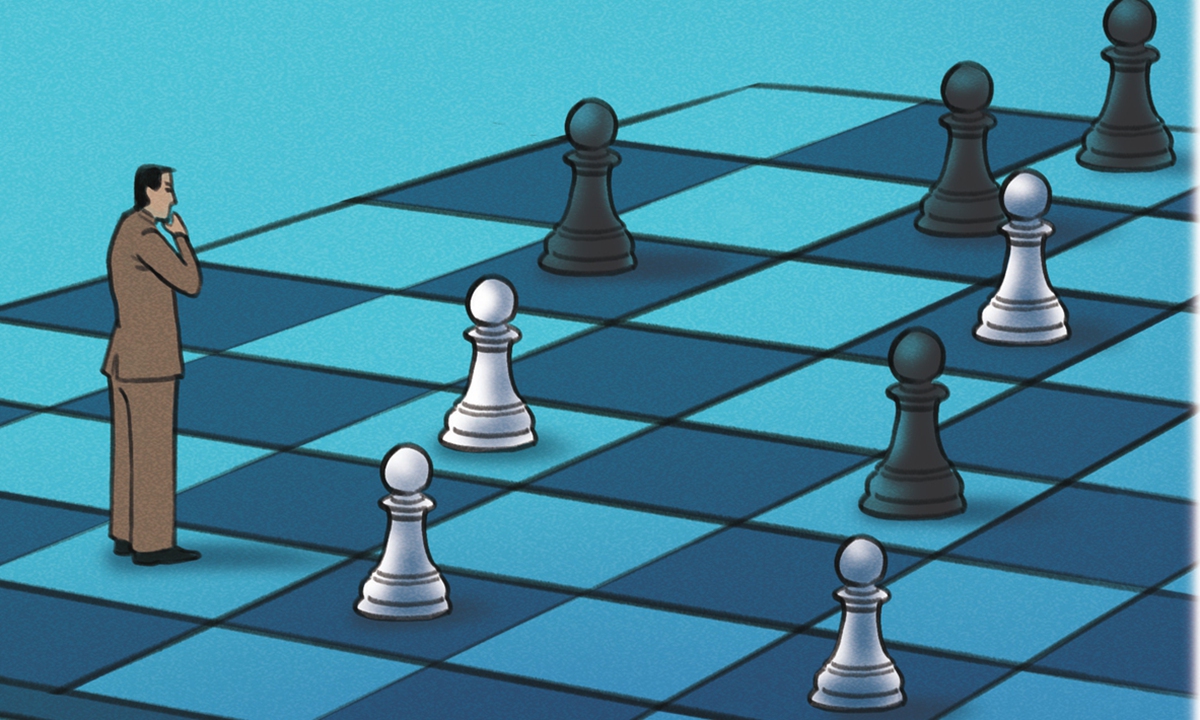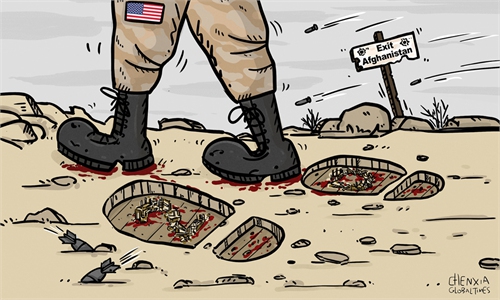
Illustration: Liu Rui/GT
An interview with former US secretary of state Henry Kissinger, published in The Wall Street Journal, went viral recently. Kissinger sees today's world as verging on a dangerous disequilibrium. "We are at the edge of war with Russia and China on issues which we partly created, without any concept of how this is going to end or what it's supposed to lead to," he said.Kissinger is an expert on the balance of power. He believes that world stability depends on a balance of power, and a balance between capabilities and objectives. But now, he thinks the US has broken this due balance, and the world is on the verge of a war.
This is first thanks to the reality that the US is trapped in strategic anxiety and fierce political infighting. Washington has lost its rationality when making moves. Europe was previously stable, but a conflict broke out because of US-dominated NATO's eastward expansion. Now, the US is stirring up trouble on the Taiwan question, taking away the peace, stability and integration Asian countries want. Washington's target is to create an unbalanced situation which suits the US. So that it can keep its hegemony on the lack of balance globally in the long run.
Second, during the process of maintaining its hegemony, all countries are viewed by the US as its pawns. When needed, the pawns will be extracted for their values. When they are no longer useful, they will simply be abandoned or sacrificed. The US, in the meantime, places its own interests above all its pawns.
Third, the Eurasian continent is at the center of the US hegemonic chessboard. US strategic policy-makers do not want to just compete with China and Russia, but also to become the sole political arbiter in Eurasian lands and prevent the emergence of any rival power threatening US' material and diplomatic interests, as renowned geostrategist Zbigniew Brzezinski stated in his book The Grand Chessboard.
Fourth, the US pursues brinkmanship. It believes that it can watch the fire from the shore and flexibly engage in offshore balancing. It hopes to control hotspots or crises through proxy wars and profit from them. This is a dangerous game. No one can avoid getting his shoes wet if he always walks along the riverside. The US, for the moment, can hardly fix its own problems at home, how can it possibly make sure that brinkmanship won't lead to a real war?
In order to maintain its hegemonic position in the world, the US is sparing no effort to prevent any potential rival in Eurasia from challenging its dominant position in Eurasian affairs. As a result, it continues to maintain a system of multilateral and bilateral military alliances, form cliques and making bluffs, and strengthening its control over Eurasia and even the world.
As for the risks and disasters that this choice will cause to the world, the US simply does not care. At present, the US believes that China and Russia are posing a challenge to its dominance of the Eurasian continent. China's Belt and Road Initiative and Russia's Greater Eurasian Partnership Strategy are seen as threats by the US. This is not allowed by the US. So it is utterly discomforted and is using every possible means, (apart from going into a war) to suppress the two countries.
The US must not fill its head with major power games. If it continues its reckless manner in the time of decline, sticks to its outdated mentality amid an era of great changes, it will no longer be a positive leading role in the world. On the contrary, it might lead the globe into an abyss.
The author is vice president of China Foreign Affairs University. opinion@globaltimes.com.cn


